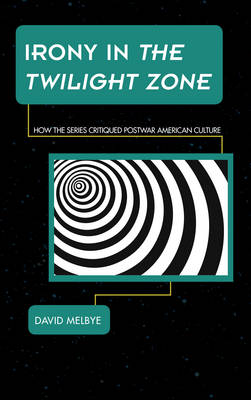
Stock image for illustration purposes only - book cover, edition or condition may vary.
Irony in The Twilight Zone: How the Series Critiqued Postwar American Culture
David Melbye
€ 127.92
FREE Delivery in Ireland
Description for Irony in The Twilight Zone: How the Series Critiqued Postwar American Culture
Hardback. This book explores the multiple types of irony-technological, invasive, martial, sociopolitical, and domestic-that were employed by the classic television show The Twilight Zone. Each of these uses of irony acts as a critique of a specific aspect of American culture, but all inform each other, creating a larger sense of social critique. Series: Science Fiction Television. Num Pages: 240 pages. BIC Classification: APT. Category: (P) Professional & Vocational. Dimension: 229 x 152. .
Rod Serling's pioneering series The Twilight Zone (1959 to 1964) is remembered for its surprise twist endings and pervading sense of irony.While other American television series of the time also experimented with ironic surprises, none depended on these as much as Serling's. However, irony was not used merely as a structural device-Serling and his writers used it as a provocative means by which to comment on the cultural landscape of the time. Irony in The Twilight Zone: How the Series Critiqued Postwar American Culture explores the multiple types of irony-such as technological, invasive, martial, sociopolitical, and domestic-that Serling, Richard Matheson, Charles Beaumont, and other contributors employed in the show. David Melbye explains how each kind of irony critiqued of a specific aspect of American culture and how all of them informed one another, creating a larger social commentary. This book also places the show's use of irony in historical and philosophical contexts, connecting it to a rich cultural tradition reaching back to ancient Greece. The Twilight Zone endures because it uses irony to negotiate its definitively modernist moment of high social consciousness and low cultural escapism. With its richly detailed, frequently unexpected readings of episodes, Irony in The Twilight Zone offers scholars and fans a fresh and unique lens through which to view the classic series.
Product Details
Publisher
Rowman & Littlefield
Format
Hardback
Publication date
2015
Series
Science Fiction Television
Condition
New
Weight
540g
Number of Pages
254
Place of Publication
Lanham, MD, United States
ISBN
9781442260313
SKU
V9781442260313
Shipping Time
Usually ships in 15 to 20 working days
Ref
99-2
About David Melbye
David Melbye has taught a broad range of media studies courses at a variety of universities and academies in Southern California and abroad. He has also worked in the Hollywood television industry, contributing as a music producer for popular shows including Friday Night Lights, Queer Eye for the Straight Guy, and One Life to Live. Melbye is the author of Landscape Allegory in Cinema (2010).
Reviews for Irony in The Twilight Zone: How the Series Critiqued Postwar American Culture
David Melbye provides meticulous analyses of the groundbreaking television series's use of irony as a narrative strategy to critique postwar America.... Melbye's book is often compelling reading and offers an important contribution to the reader's understanding of The Twilight Zone and to the use of irony as a tool of social critique. As such, this book could be used in numerous popular culture, American studies, and cultural studies courses and on reading lists.
Journal of American Culture
While The Twilight Zone's stylistic reliance on irony, particularly in its twist endings, has often been noted, David Melbye is the first to effectively extend this observation, as he seizes upon irony as a useful trope for laying bare a host of cultural issues with which America, as well as much of the postwar world, was struggling in the 1950s and early 1960s. The story he tells of the various sorts of irony that Rod Serling and other writerswove into his series reminds us that the show bulks beyond the traditional genre boundaries of science fiction to form an influential critique of the various cultural pressures that were shaping contemporary America, including the new medium of television wherein serious commentary had to be spoken somewhat obliquely. Irony in The Twilight Zone is a significant addition to the literature on this series and on television itself.
J. P. Telotte, Georgia Institute of Technology; author of Science Fiction TV; editor of The Essential Science Fiction Television Reader
Journal of American Culture
While The Twilight Zone's stylistic reliance on irony, particularly in its twist endings, has often been noted, David Melbye is the first to effectively extend this observation, as he seizes upon irony as a useful trope for laying bare a host of cultural issues with which America, as well as much of the postwar world, was struggling in the 1950s and early 1960s. The story he tells of the various sorts of irony that Rod Serling and other writerswove into his series reminds us that the show bulks beyond the traditional genre boundaries of science fiction to form an influential critique of the various cultural pressures that were shaping contemporary America, including the new medium of television wherein serious commentary had to be spoken somewhat obliquely. Irony in The Twilight Zone is a significant addition to the literature on this series and on television itself.
J. P. Telotte, Georgia Institute of Technology; author of Science Fiction TV; editor of The Essential Science Fiction Television Reader
